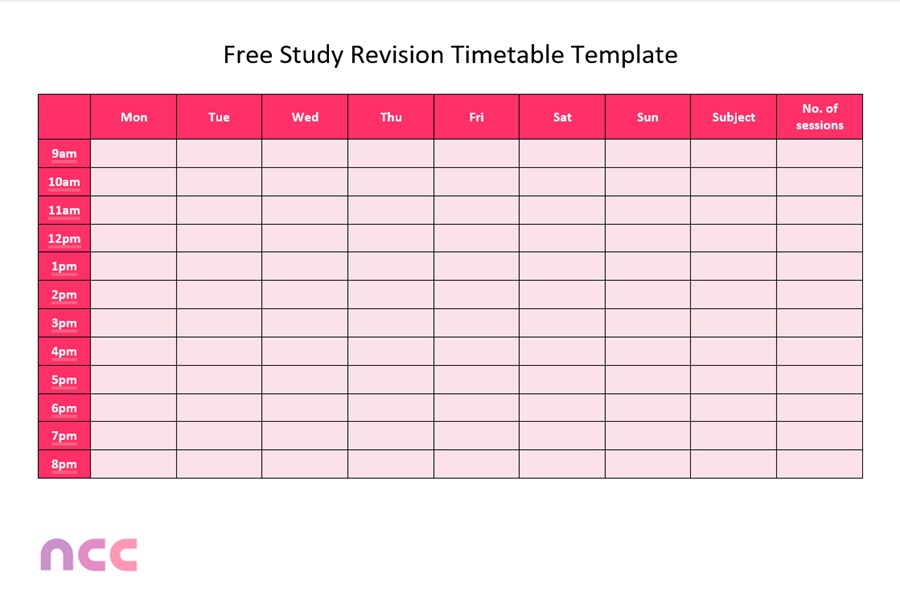Having a well-structured revision timetable at your disposal is pivotal to academic success, especially when navigating the demands of online learning.
A revision timetable can provide a sufficient structure for you to base your revision schedule around, alongside your freetime and other activities throughout the way. In this article, you will learn about the reasons behind why you need the best free study time table, provided by NCC, to guide you through your studies in order to get the most obtainable result. We will touch on the importance of realistic, detailed, and flexible planning, as well as allocating optimal study time, adequate breaks and social activities, as well as utilising digital tools to further improve online productivity.
Fancy learning beyond academic studies? Browse our range of popular online courses today and see what stands out to you.
The Importance of a Free Revision Timetable
Establishing a revision timetable prior to your revision period is an effective way to allocate sufficient study time for each subject that you are learning about. Leaving revision to the last minute can lead to unnecessary stress and may result in overlooked key topics, which may lead you to not being as successful in the examination of that topic. For further tips on how to get started with your revision, follow this guide by BBC Bitesize.

Creating Your Study Schedule
Creating a revision timetable starts with understanding the amount of time available before your exams. This involves marking out the days on a calendar dedicated solely to study, ensuring a balanced distribution of subjects. Utilising a revision timetable template at the A-level, or any study level, helps to systematically organise study periods and topics. A free revision timetable or a printable revision timetable template can be invaluable tools in this planning phase, offering a structured layout that can be customised to your academic needs.
What Makes A Good Revision Plan?
When developing your own revision plan, or using one that has been created for you, it is important that it is realistic, detailed and flexible. For instance, prioritising one subject over another won’t win you any extra marks. Being realistic with your planning will prevent yourself from becoming too overwhelmed with achieving your study goals. Flexibility is crucial, too, as it allows for adjustments based on your progress and understanding of each subject.
In essence, ensure to follow these bullet points for a better understanding of structuring your revision plan:
- Realistic Planning: Avoids the stress of unattainable goals, ensuring the timetable is achievable and manageable.
- Detailed Organisation: Specifies subjects and topics for each study session, leading to focused and productive revision.
- Flexible Structure: Allows changes to the schedule based on progress and understanding, meeting personal learning needs.
A good revision plan not only schedules study sessions but also integrates free time to recharge, reflecting the best time table for study at home. This balance is vital for maintaining motivation and preventing burnout. Additionally, digital tools and apps can offer accessible and adaptable solutions for managing your study schedule, allowing for adjustments and access from various locations.
Follow our guide on how to get UCAS points if you are unsure of this process.
How to Create a Revision Timetable
To create an effective study time table, start by gathering all necessary information, including your exam dates, class schedule, work hours, and social commitments. Gathering this information will ensure that your revision timetable is both realistic and practical.
- Gather Essential Information: Collect dates for exams, lessons, work shifts, and social events to incorporate into your timetable.
- Identify Non-Study Periods: Mark out times when studying isn’t possible, such as early mornings or social commitments, to ensure your timetable is realistic.
- Select a Start Date: Focus on subjects that are more difficult or have upcoming exams. Start on a specific day to begin your study routine.
- Allocate Study Sessions: Distribute your study time effectively across different subjects and topics, incorporating breaks to enhance focus and retention.
- Visualise Your Plan: Display your study time table prominently, using a printable revision timetable template to keep track of your progress and upcoming sessions.
Some may consider the blurting method here. If you are unsure what is blurting, you can find out now within our blog.
Maintaining Motivation with Your Revision Timetable
Following your study schedule can be challenging but sharing your plan with friends and family can provide accountability and support. Updating your timetable as needed will help you stay on track and adjust to any changes in your study pace or understanding of the material.
- Share and Update Regularly: Keep your support network informed of your study plans and progress, allowing for adjustments and encouragement along the way.
- Track and Celebrate Progress: Mark off completed topics to visualise your achievements, adding variety to your study methods to keep the process engaging and effective.
- Utilise Varied Study Techniques: Employ different revision strategies like flashcards, mind maps, group study sessions, and practice exams to cater to different learning styles and subjects.
What happens if you fail your GCSEs? This is a common fear amongst students, but don’t worry, because we have the right answers for you. Or you can even retake them using our GCSE courses online.
Tips When Prioritising Revision Subjects In Your Revision Timetable

Developing an efficient study time table begins with identifying which subjects and topics demand more focus.
Evaluate past performance, such as mock results, and consider university offers or teacher feedback to pinpoint areas needing improvement. Integrating this analysis into your study planner ensures a targeted approach, maximising your revision effectiveness.
- Assess and Prioritise: Review academic feedback from peers, tutors, and results to determine which subjects require more intensive study.
- Integrate Course Specifications: Utilise official course materials to verify your revision covers all essential topics, ensuring a well-rounded preparation.
Optimising Study Time
Understanding the time available until exams is crucial towards your overall revision performance. Instead of exact hour counting, focus on the number of days remaining to create a flexible, yet structured, revision schedule. When following your study timetable template, you should allocate days effectively that are most realistic for you, allowing for thorough preparation across all subjects. In short, consider the following:
- Calculate Revision Days: Estimate the time left before exams to distribute study sessions adequately.
- Consider Life Commitments: Factor in school, work, and personal activities to ensure your study timetable is realistic and sustainable.
Balancing Study and Wellbeing
The key to a sustainable study routine is recognising the importance of breaks and leisure time. Structuring your revision timetable to include regular intervals for rest and activities helps maintain mental sharpness and prevents burnout.
- Schedule Breaks: Plan short breaks during study sessions to boost concentration and productivity.
- Maintain Flexibility: Allow room in your schedule to adjust study plans as needed, accommodating unforeseen circumstances.
Effective Revision Techniques
There are various study methods tailored to different subjects to improve memory learning and interest. For example, use flashcards for historical dates, mnemonic devices for language learning, or diagrams for scientific subjects. This diverse approach optimises study sessions effectively, keeping engagement high and improving memory recall.
- Adapt Study Methods: Tailor revision techniques to suit the subject matter and personal learning style for more effective study sessions.
- Past Papers: Regularly practise with past exam papers to familiarise yourself with question formats and time management.
Colour Coding Tactics
Using colour coding in your study timetable can add further visual clarity, allowing you to instantly recognise which subjects are scheduled for each day, and adds an aesthetic appeal to your planning tool. This method can also be easily adjusted; a well-thought-out colour scheme can swiftly reveal any overlooked areas, enabling prompt and strategic changes to your study plan.
Using Technology To Help Revise
Revision timetable apps can be invaluable tools in managing your study schedule. Apps like My Study Life, provide customisable templates and features to track progress, schedule reminders, and even silence your phone during study times to minimise distractions.
Use Our Free Study Timetable Template Now
In conclusion, crafting a well-organised study timetable is crucial for effective revision. By prioritising subjects, integrating flexible study sessions, and employing strategic breaks, students can drastically improve on their revision strategies. With sufficient methods such as colour coding and revision apps further optimises the planning process. Ultimately, a balanced and adaptable approach to scheduling study time will allow for a productive and stress-free revision experience, leading to academic success and personal well-being from your education.
Even if you don’t get the grades you want, you can learn how to defer university for short term alternatives.
FAQs
What is the best revision timetable?
The best revision timetable is one that is personalised to fit your study habits and schedule, evenly distributing subjects over the available time, with regular breaks and varied tasks to keep you engaged.
How many hours of revision a day?
It’s recommended to aim for 2-4 hours of focused revision per day, with breaks, ensuring you have time to rest and prevent burnout.
How do I set up a GCSE revision timetable?
To set up a GCSE revision timetable, list all subjects and topics, allocate time based on exam dates and difficulty, include regular breaks, and be realistic about how much you can study each day. Review and adjust your timetable as needed.
What is the best app for revision timetables?
Apps like My Study Life, Exam Countdown, and Timetable are popular for creating revision timetables, offering features like reminders, syncing across devices, and customization.
What is the 2 3 5 7 study method?
The 2 3 5 7 study method involves studying in blocks of time that follow these prime numbers, for example, 2 hours of one subject, followed by a break, then 3 hours of another subject, and so on, to maximise focus and retention.
Is 2 hours a day enough revision?
Two hours a day can be enough revision if it’s consistent, focused, and part of a well-structured study plan, especially if started well in advance of exams.
Sources
BBC Bitesize. (2023) Revision: How to get started. [online] Available at: https://www.bbc.co.uk/bitesize/articles/z9py97h [accessed 13/03/24]
App Store Preview. (n.d.) My Study Plan. [online] Available at: https://apps.apple.com/us/app/my-study-life-school-planner/id910639339 [accessed 13/03/24]








